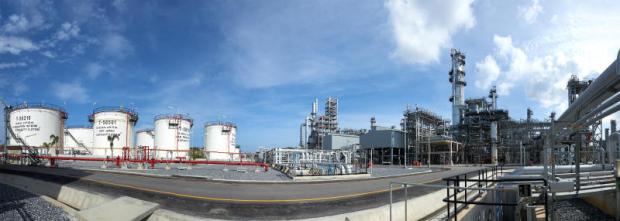While US air strike on Syria following a chemical weapons attack that killed dozens of civilians last week may not have a direct impact on Thailand, local analysts and politicians are wary about the inevitable effect on oil prices.

Thai Oil petrochemical plant in Sri Racha. The country's largest oil refiner is maintaining its global oil price projection of US$50-55 per barrel for this year.
Atikom Terbsiri, president and chief executive of the country's largest oil refiner Thai Oil Plc, said global oil prices jumped in the immediate aftermath of the Syrian bombing, and the situation has to be monitored closely.
"If the conflict is limited to the region, then the oil price spike should be short-term. But if the conflict spreads, we should expect price volatility to linger," said Mr Atikom.
The market still has a surplus of crude oil, helping to tame the price increases, he said.
The bombing sites are also located quite far from major oil resources and high-volume transport channels.
Thai Oil still maintains its global oil price projection in a range of US$50-55 per barrel for this year.
"We still believe oil prices will increase for the short term, then return to normal," said Mr Atikom.
He said the company has managed to secure crude oil resources from many areas around the world apart from the Middle East, including those far from conflicts areas.
For Thai Oil's capacity utilisation this year he expects it to be on par with last year at 100% thanks to high demand growth both domestically and in Asia.
Its full capacity runs at 275,000 barrels a day. The company plans to open bidding soon for construction on a new expansion phase to reach 400,000 barrels a day. Thai Oil plans to expand its refinery area in Sri Racha by 200 rai.
The new refinery unit is set to cut operating costs sharply, while helping to increase the crude premium to a range of $3-4 a barrel.
The upgrade should also make it easier to refine more grades of crude oil from a wider variety of resources.
Commerce Minister Apiradi Tantraporn said the US military strike in Syria is unlikely to greatly affect Thai exports and inflation, although it will result in an oil price increase for the short term.
"The ministry predicts oil prices will rise further if the US continues its missile strikes on Syria. This may benefit shipments of Thailand's oil-related products," she said.
"But if the conflict is prolonged, this may trigger mounting international tension, leading to delays in global trade and investment," said Mrs Apiradi.
"Higher oil prices will affect production costs and retail prices of local products, which will eventually raise the inflation rate."
The ministry has pledged to closely monitor the negative impact of the US strikes to ensure the country's economic recovery stays on pace.
Pimchanok Vonkorporn, director-general of the Commerce Ministry's trade policy and strategy office, said it is maintaining its export growth forecast at 3-3.5% this year, with inflation staying at 1.5-2.2%. The forecasts are based on oil prices of $50-60 a barrel and a foreign exchange of 35.5-37.5 baht against the dollar.